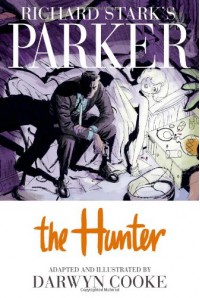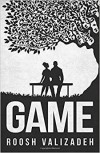Richard Stark's Parker, Vol. 1: The Hunter
 Gritty.
Gritty.No other book has ever tried to convey the tone of noir in frames and succeeded like this one. The art makes the comic better than the novel.
Not to mention the fact that the comic has purged out all the unnecessary things and that makes the hero much more brutal than the novel. The art is just another kick in the gut that helps the feeling to sink in.
And the color tone never fit the tone of the story better.
Just a look at that bluish tone along with the pulpy page color with the mention of the word crime fiction noir makes your heart jump.
And the opening is just perfect. The first 30 or so pages is a kick ass example of how skill, tone and angles can capture a now cheesy description into pure awesomeness. The problem starts with the start of
the dialogs. The story was written in 1962 and it becomes painfully apparent in some of the dialogs.
The other problem comes from the story itself. Once Mal Resnick is dead, the hero (or rather, anti-hero) goes into an uncharacteristic overdrive with himself wondering why he does the things he does. The reasoning for the events in the last few pages seem forced and it seems as if Richard Stark aka Westland wrote it as an after thought and maybe for the heck of it. Which, needless to say, transgresses the nature of the character and the narration.
I did read the novel before the comics and to be frank, the novel drags more in the end. Cooke was intelligent enough to cut out the later parts and end the book with a slightly altered climax, but that doesn't help much either.
There is one minor problem which becomes slightly uncomfortable later in the book which pertains to the soulless, surly character of Parker. In the novel, Parker was a bad-ass but he had doubts and reservations which made some of the choices he made a bit believable. In the comics, he is stripped of all his doubts and reservations and is made a machine, cold blooded, calculating and unstoppable. Which is good, if only the story fit that alteration. The later part of the book suffers especially because of that. An example would be the Carter scene, which the Parker from the novel might do but not the steely Parker from the comics.
Grab the book and treat yourself to the fantastic visualization of Cooke. Crime fiction noir, via his pencil is pure gold. The story though, hasn't fared well.






